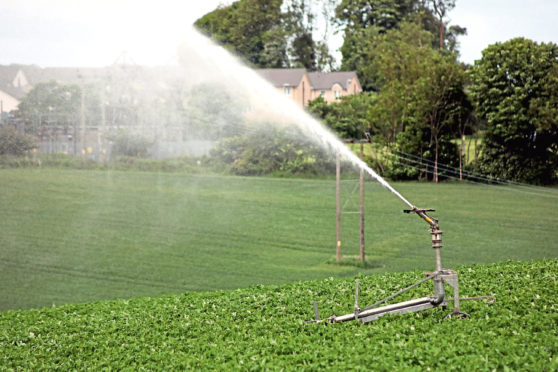Irrigators are working their way across fields the length and breadth of Scotland as growers try to give thirsty tattie and vegetable crops a much-needed drink.
Cereals growers are also crying out for rain amid reports many later-sown crops are struggling, leading to concerns yields for both grain and straw could be lower at harvest.
Farming union NFU Scotland (NFUS) is urging growers to only irrigate crops when it is absolutely necessary, and to work with neighbours in the same river catchment area to avoid irrigating at the same time.
It said Scottish Environmental Protection Agency (SEPA) figures reveal a water scarcity across Scotland, with groundwater levels in the north-east exceptionally low, and levels in the south-west and east of the country starting to fall below the normal range for this time of year.
“Things remain exceptionally dry and some crops of wheat and barley, particularly those sown late this spring, are stressed and suffering –that means lower yields of both grain and straw,” said NFUS combinable crops chairman, Willie Thomson.
“A good drop of rain would put all cereal farmers in better fettle.”
Farm levy body AHDB’s arable knowledge exchange manager, Chris Leslie, said crop variation was reducing as the later and poorly established crops caught up, however split germination is likely to present difficulties in spring barley quality.
He added: “Straw potential will be variable as growth regulation has been applied knowing the nutrition was sat there.
“It may look like an early harvest is on the cards and growers will be keen to press the reset button and restructure soils as quickly as possible, so straw trade may be slow if fields are deemed to be not worth bailing.”
NFUS potatoes working group chairman, Peter Grewar, said the impact of the dry weather on the potato crop was minimal so far and only some varieties were in need of water right now for scab control.
He said: “It is the weather from here on in that matters. Those who have invested in irrigation resilience will have no issues.”
Meanwhile, machinery ring Ringlink’s managing director, Graham Bruce, said grass crops were also affected by the dry weather.
He said: “Silage crops are well back in yield compared to last year but members are reporting good quality.”
On straw supplies, Mr Bruce said carryover from 2019 would help alleviate any shortfall in supplies from Harvest 2020.
He said predictions of a straw shortage during the dry summer of 2018 didn’t materialise, but instead pushed prices up to the point people sought alternatives and some farmers were left with straw to sell in the late spring of 2019.
